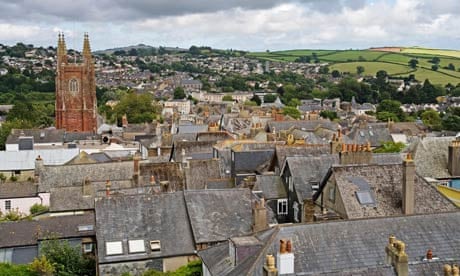Totnes is an ancient market town on the mouth of the river Dart in Devon. It has the well- preserved shell of a motte-and-bailey castle, an Elizabethan butterwalk and a steep high street featuring many charming gift shops. All of which makes it catnip to tourists. A person might initially be lulled into the belief that this was somewhere with as much cultural punch as, say, Winchester.
But bubbling below the surface is a subversive hub of alternative living, a legacy of the radical goings-on from Dartington Hall, just down the road, where Dorothy and Leonard Elmhirst's vision of a rural utopia gathered steam in the 1920s. Indeed, there are more new age "characters" than you can shake a rain stick at, more alternative-therapy practitioners per square inch than anywhere else in the UK and the town was once named "capital of new age chic" by Time magazine.
My family moved here when I was 10. A child of relentlessly suburban mindset, I found the town's granola outlook unsettling. I balked at the indigenous footwear worn by Totnesians – multicoloured pieces of hand-stitched leather called "conkers" – and longed for a world where it was not atypical to own a TV and talk about Dallas rather than nuclear disarmament. My fear growing up in this neck of the woods was that people would continue to get even weirder. So it was probably just as well that I had left when Rob Hopkins arrived in 2005 and let loose the Great Unleashing, aka the launch of Transition Town Totnes (TTT).
Six years on, the Transition initiative, which attempts to provide a blueprint for communities to enable them to make the change from a life dependent on oil to one that functions without, seems to me one of the most viable and sensible plans we have for modern society. I write this on the day it is announced that the UK economy shrank by a "shock" 0.5% in the last quarter of 2010. Everyone is blaming the weather. Hopkins isn't. Neither is he particularly shocked.
"I think the unravelling of the debt bubble has only really started," he says. "Up until 2008 it was all about a growing economy and cheap energy. Then we had expensive energy plus economic growth, then we had cheap energy and economic contraction. So the next phase is volatile energy and economic contraction. It's not rocket science."
Hopkins was in Kinsale, Ireland, working as a teacher of permaculture – a sustainable, design-based horticultural technique where growing systems mimic the ecology of the natural world – and establishing an eco village, when he attended a lecture on "peak oil" in 2004. It was his Damascene moment. According to theorists such as Richard Heinberg, whose tome The Party's Over charts life without oil, we have passed the point at which oil supplies peak (that was back in May 2005). From there on in oil production declines and we attempt ever more audacious land grabs to get it. But oil remains the lifeblood of our economy and lifestyle. What happens when the oil runs out or is disrupted? In 2000 UK truck drivers brought the UK's food chain to its knees by blockading oil terminals. At the height of the protest the UK was 72 hours away from running out of food. If there were scant emergency measures in place, there was absolutely no vision of a life after oil.
Hopkins began to see how dependent he was on his car, to ferry his kids around and get to work. As a constructive response he began to develop an Energy Descent Action Plan for Kinsale with his students. They looked for historical examples of when the area had been more robust, more resilient to shock changes, such as when it had possessed a more localised food system. The plan split life up into categories – energy, food, transport, homes – all of which had their own solutions.
Critically, it dealt with practical considerations – for example, how much well-managed woodland would it take to heat a town? Central to the whole plan was the idea that permaculture gardening could be scaled up to bring food resilience to town centres. It offered Plan B, because Plan A was doomed to failure.
In search of a town big enough for the plan to have a wider effect, Hopkins moved back to Totnes, with its population of 23,000, with his wife Emma and their four children, and he worked on a version of the Energy Descent Action Plan with local resident Naresh Giangrande. "After I'd been involved in Kinsale I wanted to live somewhere where there were examples of a more resilient community already up and running, pieces of the jigsaw such as a good local food system, so that people could envisage how we could develop a community."
Ben Brangwyn, a relatively recent arrival to Totnes who was to become co-founder of the Transition Network was sold as soon as he heard Hopkins giving a lecture. "It was pretty clear to me, having studied re-localistion efforts around the world, that what Rob and his students had developed in Kinsale was pretty much the smartest bottom-up response to climate change and peak oil that we had seen," says Brangwyn. He wasn't the only person that thought so. Word that there was a man with an actual plan had spread fast and Hopkins was deluged by interest from all over the world. It was clear his ideas needed to be worked up into a more formal movement. "The leap of brilliance in the energy plan was the idea that you can segregate responses to these pressures into energy, food, education, use of transport, local economics, etc," explains Brangwyn. "That's one of the secrets of transition: anybody who has a passion can find a place."
"It's not my movement," Hopkins explains, clearly uncomfortable at being portrayed as the face of the Transition Towns movement. "We're not Coca-Cola, we don't send out a franchise model. It's up to individual communities to interpret Transition however it works best."
The Transition movement works on the basis that if we wait for government to act on issues such as climate change we'll be waiting until hell freezes over; and if we only act as individuals, that's too little. So it's working together as communities where the real change will happen. In offices on that steep high street, squeezed between the pet shop and a travel agency, Transition Town Totnes was formed, swiftly followed by the Transition Network, to support the growth of the movement outside Totnes.
There are now more than 350 Transition movements, 200 of them in the UK. Last month the first Australian region, Sunshine Coast, became an official Transition Town. Hundreds more communities are mulling over the idea of embracing Transition (they are known as mullers). While there has been some debate among greens as to whether Transitioners are right to put so much emphasis on peak oil, and whether climate change should really be the main driver for change, it is clear that the strategy laid out in the latest Energy Descent Action Plan is one that will protect communities in the event of both oil shocks and climate change (and possibly economic shocks, too). It certainly beats stockpiling tinned food and buying a firearm.
As I leaf through the neat action plan, it brings order to apocalyptic scenarios and creates a vision of how Transition Town Totnes could be in 2030. Some strategies are niche, but some strategies are the stuff of market-town revolution. George Heath ran a flourishing market garden in the 1920s; his son inherited the business, opening a shop on the high street to sell the local, fresh produce. Today David Heath, his grandson, shows me the site of the market garden and large urban greenhouse in the centre of town. Since 1981 it's functioned as one of the town's main car parks. The Transition plan is to convert it back to a market garden by 2030. How close is the town to realising its alternative narrative?
"We did have a German visitor who was very disappointed," says Brangwyn, "because there were still cars in the town and there were no goats on the roof." Totnes hosts an increasing number of Transition pilgrims who want to see what's going on, and, says Brangwyn, "People have different expectations. We're not going to make big visual changes overnight. Transition is ground up, it's about people doing the work for themselves. So the culture has to change first.'
I look for visual signs of change regardless. Walking through town, the most obvious is the 74 photovoltaic panels on the roof of the civic hall. I wander down an alleyway in the centre of town to observe some gardens belonging to householders who were previously too busy or lacking the green fingers to make them productive. They are now little engines of town-centre production, part of the Transition Network's garden-share scheme run by Lou Brown.
"I began the project because I spent a long time in rented accommodation wandering around the town with my husband, coveting bits of garden," says Brown. "We have up to 30 gardeners across 16 gardens producing a lot of food. A quarter to a fifth generally goes to the garden owner. Kale, flowers, beetroot, you name it, it gets grown. Obviously this is great for developing local food resistance, particularly because we have a shortage of allotments in Totnes and a big waiting list. The allotment society is trying to find new land all the time, and the garden share is like a seedbed for some growers while they are waiting."
I find resident Steve Paul delighted with his ten 1.85 kW photovoltaic panels, bought through Transition's Street Scheme. "I've already avoided 0.55lb of carbon this morning," he says, checking the monitor. One notable aspect of Transition Town Totnes is that you find renewables on perfectly normal housing. Last year the Transition Street Programme was one of 20 projects to win funding from the Department of Energy and Climate Change. It invited streets to get together to change behaviour, improve energy efficiency and then to install renewable energy systems. What's more it provided quantifiable data: more than 500 households became part of the scheme, 70% were households on a limited income, and every household cut their carbon by an average of 1.2 tonnes, saving £600 a year.
Not everything has gone as swimmingly. A local currency is central to the Transition plan. "Think of a leaky bucket," explains Brangwyn. "Any time we spend money with a business that's got more links outside the community than in it, we leak money from the local economy. What local currency does is allow that wealth to bounce around in that bucket. We've barely touched the surface of systems that will benefit the local economy. We don't just need our own pound note but a credit union, electronic means of transaction, a time bank." And although you can detect a certain fondness for the Totnes pound note on the local high street, it hasn't been as successful as Transition currency in Lewes, Brixton and Stroud. There's still work to be done.
But Hopkins reckons TTT is still ahead of schedule. "When I wrote The Transition Handbook (published in 2008) I was working up to the Energy Descent Plan, a sort of blueprint for the development of any community. But we did that in Totnes a year ago. So strictly speaking we've finished and we can pack up and go home feeling good about ourselves. But that was just the beginning. The aim of Transition is to try to relocalise the economy where it's happening, and be a catalyst for that process of intentional relocalisation."
There is a fine line between making residents aware of initiatives such as the Transition Street Project and haranguing them until they sign up. Transitioners seem of the opinion that the latter would be fruitless; the drive needs to come from the community to join up. So at the moment it is perfectly possible to visit Totnes and not be aware it's a Transition Town at all. But that will inevitably change. Local councillors already report that when they introduce themselves at national conferences and say "from Totnes", other delegates comment, "Ah, Transition Town Totnes." Word is spreading.
Hopkins is keen to stress that this is very different to David Cameron's interpretation of localism, devolving power from central government. "It doesn't mean putting a big fence up around Totnes and not letting anything in or out. It doesn't mean Totnes will be making its own laptops and frying pans. But it means in terms of food, building materials, a lot more of that can be done locally. Which in turn makes the place much more resilient to shocks from the outside."
And funnily enough Transition principles seem to appeal to politicians. As the Guardian journalist Madeleine Bunting put it, in May 2009: "If you want to catch a glimpse of the kinds of places outside the political mainstream where that new politics might be incubated, take a look at the Transition movement. Ed Miliband… was one of the first to spot its potential… and last year The Transition Handbook came fifth in MPs' lists of summer reading… The Transition movement is engaging people in a way that conventional politics is failing to do." But what of David Cameron's coalition government? "I think Transition could be part of a genuine Big Society," says Hopkins, "but only where initiatives really give power and assets to the community."
The great plan in Totnes included the planting of 186 hybrid nut trees around town. You can just walk around and help yourself to free nuts, which can only help community cohesion. But John Crisp, a local farmer who in his spare time heads up Transition Town's new Food Hub project, is keen to point out that the vision extends beyond nuts and that, come April, Totnesians will be able to order their weekly shop online and collect it on a Saturday from the local school. "This is an initiative that connects local farmers to Transition, automatically engaging us with the farming community, of which I am one. And consumers get to buy local produce at prices comparable to those at the supermarket. Our overheads are so small that while shops and supermarkets charge a 30-40% mark up, we'll be at 10%. Meanwhile we give producers a fair return for their produce – more than they would get anywhere else."
More change is coming. Totnes Renewable Energy Society (TRESOC), an offshoot of TTT, has two applications in for wind turbines on nearby Kingsbridge hill and recently issued shares so Totnesians will be able to power-down, saving their own energy. And the TTT has designs on the old Dairy Crest building near the station as part of its bid to get more assets into community ownership. When these totemic Transition symbols are up, they should invite the German guy back.



